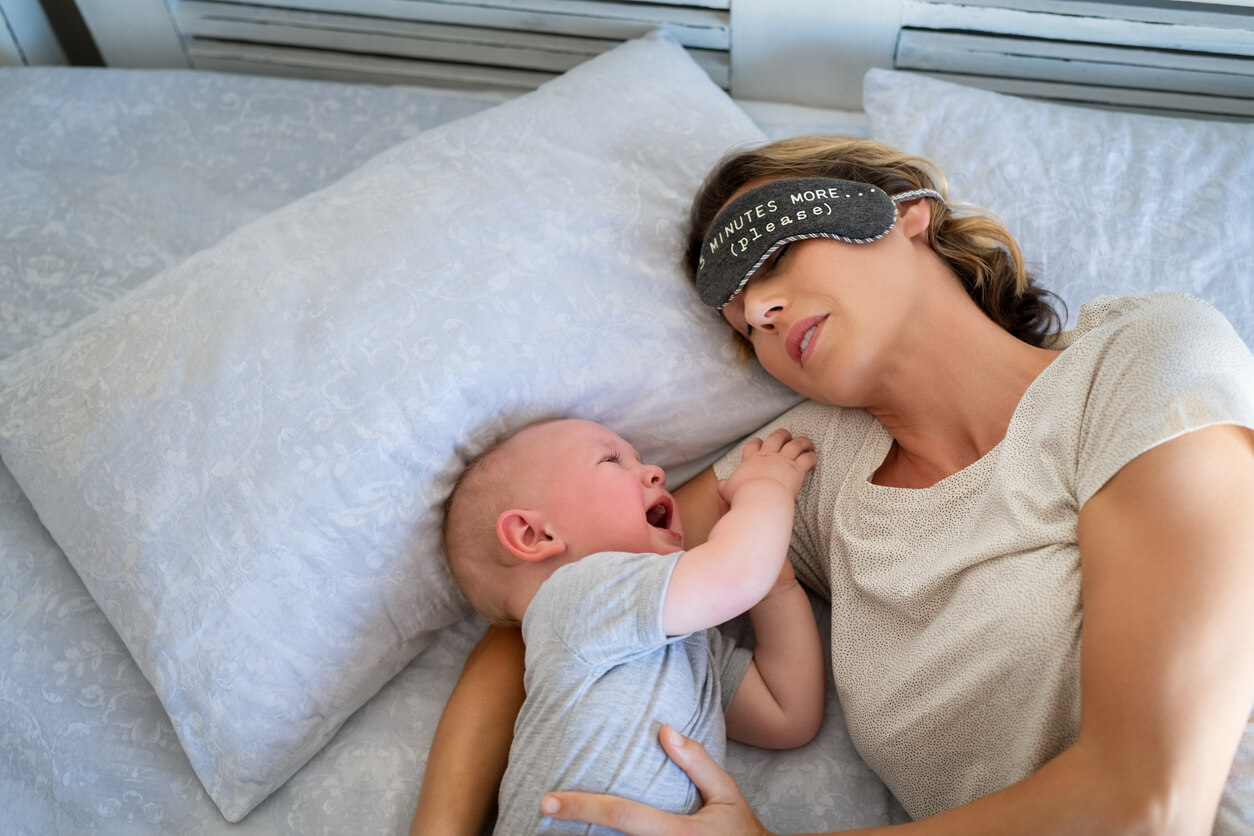Why Does My Baby Wake Up Screaming and Crying?


Written and verified by the psychologist Elena Sanz Martín
A child’s cry is the most painful sound for a mother and the one that causes the most distress and worry. Especially during their first years of life, when the little one can’t communicate, hearing them cry and contemplating their discomfort can generate great anxiety because you don’t know how to comfort them. If during this stage of life your baby wakes up screaming and crying during the night frequently, we’ll tell you what may be the causes.
You have to keep in mind that, through crying, your child communicates with you, alerts you that they have needs that need to be met, or asks for your support to help them to regulate themself, as they can’t do it by themself. The most important thing in these situations is that you remain calm and address your baby with love and serenity. Raising your voice, getting angry, or despairing will only increase your child’s distress. Understanding what’s happening will help you to act correctly.
Discover why your baby wakes up screaming and crying
One of the main reasons why a baby wakes up screaming and crying is because of the absence of their attachment figures. We can’t forget that children are vulnerable and dependent beings who need adults in order to survive. You know they’re at home and safe, but for their primitive brain, danger’s imminent.
They need your presence
Waking up and finding themself alone in the dark can be frightening for your little one. Therefore, the most natural mechanism is to resort to crying to alert their protectors. In addition, at around eight months of age, babies experience what’s known as separation anxiety.

They feel uncomfortable and frustrated
Babies have a number of needs that need to be met. Food, hygiene, and comfort are fundamental aspects for an infant to feel at ease and fall asleep. If your child’s hungry, has a wet diaper, or feels hot or cold, they’ll be uncomfortable and will need you to help them. Keep in mind that some children are much more sensitive than others to these sensations and may need to be tended to more frequently.
The same is true if your baby is sick or teething. Pain, fever, coughing, and colic are uncomfortable situations that your little one doesn’t know how to deal with. Your presence and support are therefore essential in order to comfort them and help them feel better.
They can’t fall asleep
Your baby may wake up screaming and crying because they’re having a hard time falling back asleep. Babies are light sleepers and awakenings are frequent. A noise, an uncomfortable sensation, or a change in sleep phase are some of the reasons for awakening. In this case, the baby is still tired but hasn’t yet learned to fall back to sleep on its own. Therefore, the crying and screaming are an expression of frustration and a call for help.
Night terrors
Finally, if your baby wakes up screaming and crying or is agitated and very nervous, it may have had an episode of night terrors. This is a common parasomnia in infants but can appear as early as 12 to 18 months of age.
When this happens, the child experiences very intense fear, screams, cries, and is agitated. The episode usually lasts from a few seconds to a few minutes and the infant, although appearing awake, isn’t really awake. Therefore, it’s difficult to wake them up, and if this is achieved, they’ll be very confused.
Later on, around the age of three, nightmares may also appear. In this case, the infant does wake up and is able to remember what they dreamt.

What to do if your baby wakes up screaming and crying?
Now that you know some of the most common reasons why your baby may wake up crying, it’ll be easier for you to understand and help your baby. However, here are some tips that may be helpful:
- Make sure your baby’s needs are met. Sometimes feeding, diapering, or covering the baby with a blanket is enough to increase comfort, soothe the baby, and promote sleep.
- Consult with your doctor. If there’s a health condition, it’s important to consult your pediatrician. However, gum massages or cooled teethers can, for example, help with teething. Likewise, your hugs, words, and cooing can help your baby feel better and cope with discomfort.
- Sleep close to your baby. For children, sleeping close to their parents is extremely soothing. Feeling their presence helps them fall back to sleep after an awakening. Co-sleeping can be a good option, although it depends on each child and each family. In any case, go to your child’s call when they experience the anxiety of waking up alone.
- Get close to your little one. Sometimes babies move and make noises as part of sleep and, if you wait a few seconds, they can go back to sleep peacefully. But, in case this doesn’t happen and the crying continues, get close to your little one, stroke them, talk to them, or sing softly to them. Let him feel that you’re there. Allowing a child to cry without attending to them can generate great anxiety.
A matter of time
Ultimately, during the first few years of a baby’s life, crying awakenings can be common. As your child matures cognitively, becomes more independent, and learns to regulate themself, they’ll need less of your constant support and presence. For now, nurture them so that they grow up feeling loved and protected. And, of course, tend to their calls. This will save them a lot of suffering now and in the future.
A child’s cry is the most painful sound for a mother and the one that causes the most distress and worry. Especially during their first years of life, when the little one can’t communicate, hearing them cry and contemplating their discomfort can generate great anxiety because you don’t know how to comfort them. If during this stage of life your baby wakes up screaming and crying during the night frequently, we’ll tell you what may be the causes.
You have to keep in mind that, through crying, your child communicates with you, alerts you that they have needs that need to be met, or asks for your support to help them to regulate themself, as they can’t do it by themself. The most important thing in these situations is that you remain calm and address your baby with love and serenity. Raising your voice, getting angry, or despairing will only increase your child’s distress. Understanding what’s happening will help you to act correctly.
Discover why your baby wakes up screaming and crying
One of the main reasons why a baby wakes up screaming and crying is because of the absence of their attachment figures. We can’t forget that children are vulnerable and dependent beings who need adults in order to survive. You know they’re at home and safe, but for their primitive brain, danger’s imminent.
They need your presence
Waking up and finding themself alone in the dark can be frightening for your little one. Therefore, the most natural mechanism is to resort to crying to alert their protectors. In addition, at around eight months of age, babies experience what’s known as separation anxiety.

They feel uncomfortable and frustrated
Babies have a number of needs that need to be met. Food, hygiene, and comfort are fundamental aspects for an infant to feel at ease and fall asleep. If your child’s hungry, has a wet diaper, or feels hot or cold, they’ll be uncomfortable and will need you to help them. Keep in mind that some children are much more sensitive than others to these sensations and may need to be tended to more frequently.
The same is true if your baby is sick or teething. Pain, fever, coughing, and colic are uncomfortable situations that your little one doesn’t know how to deal with. Your presence and support are therefore essential in order to comfort them and help them feel better.
They can’t fall asleep
Your baby may wake up screaming and crying because they’re having a hard time falling back asleep. Babies are light sleepers and awakenings are frequent. A noise, an uncomfortable sensation, or a change in sleep phase are some of the reasons for awakening. In this case, the baby is still tired but hasn’t yet learned to fall back to sleep on its own. Therefore, the crying and screaming are an expression of frustration and a call for help.
Night terrors
Finally, if your baby wakes up screaming and crying or is agitated and very nervous, it may have had an episode of night terrors. This is a common parasomnia in infants but can appear as early as 12 to 18 months of age.
When this happens, the child experiences very intense fear, screams, cries, and is agitated. The episode usually lasts from a few seconds to a few minutes and the infant, although appearing awake, isn’t really awake. Therefore, it’s difficult to wake them up, and if this is achieved, they’ll be very confused.
Later on, around the age of three, nightmares may also appear. In this case, the infant does wake up and is able to remember what they dreamt.

What to do if your baby wakes up screaming and crying?
Now that you know some of the most common reasons why your baby may wake up crying, it’ll be easier for you to understand and help your baby. However, here are some tips that may be helpful:
- Make sure your baby’s needs are met. Sometimes feeding, diapering, or covering the baby with a blanket is enough to increase comfort, soothe the baby, and promote sleep.
- Consult with your doctor. If there’s a health condition, it’s important to consult your pediatrician. However, gum massages or cooled teethers can, for example, help with teething. Likewise, your hugs, words, and cooing can help your baby feel better and cope with discomfort.
- Sleep close to your baby. For children, sleeping close to their parents is extremely soothing. Feeling their presence helps them fall back to sleep after an awakening. Co-sleeping can be a good option, although it depends on each child and each family. In any case, go to your child’s call when they experience the anxiety of waking up alone.
- Get close to your little one. Sometimes babies move and make noises as part of sleep and, if you wait a few seconds, they can go back to sleep peacefully. But, in case this doesn’t happen and the crying continues, get close to your little one, stroke them, talk to them, or sing softly to them. Let him feel that you’re there. Allowing a child to cry without attending to them can generate great anxiety.
A matter of time
Ultimately, during the first few years of a baby’s life, crying awakenings can be common. As your child matures cognitively, becomes more independent, and learns to regulate themself, they’ll need less of your constant support and presence. For now, nurture them so that they grow up feeling loved and protected. And, of course, tend to their calls. This will save them a lot of suffering now and in the future.
All cited sources were thoroughly reviewed by our team to ensure their quality, reliability, currency, and validity. The bibliography of this article was considered reliable and of academic or scientific accuracy.
- Middlemiss, W., Granger, D. A., Goldberg, W. A., & Nathans, L. (2012). Asynchrony of mother–infant hypothalamic–pituitary–adrenal axis activity following extinction of infant crying responses induced during the transition to sleep. Early human development, 88(4), 227-232.
- Bilbao, Á. (2017). Todos a la cama: Cómo ayudar a tu bebé a dormir con amor y confianza. Plataforma.
- Zamora, T., Pin, G., & Dueñas, L. (2014). El Papel de la matrona en la higiene del sueño del futuro bebé. Introducción al sueño y claves principales en la prevención de riesgos durante el sueño del bebé. Matronas Profesion, 2014, vol. 15, num. 1, p. 28-31.
This text is provided for informational purposes only and does not replace consultation with a professional. If in doubt, consult your specialist.








